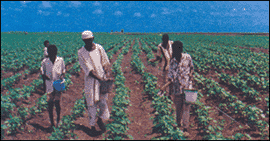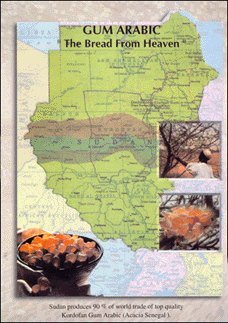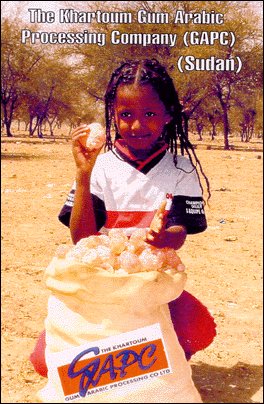 AGRICULTURE AGRICULTURE |
It was the oil sector that first attracted foreign investors to the Sudan; those mainly Asians, but since then the attention has been drawn more towards virgin sectors such as agriculture, food production, and industry, where particularly the Arabs and Europeans are actively investing. The potential in agriculture is huge, since less than 20% of the land is exploited. Moreover, 12% of the land is covered by forest. Minister of Agriculture, Dr. Magzoub Al Khaliffa, highlights the role the Sudan could play in the world: "We are one of the three important countries in the world, alongside with Australia and Canada, to be capable of solving the insufficiency in food production for the benefit of the whole world. We have fertile land, we have satisfactory water resources, diversified climate conditions and we have integrated agriculture and animal farming together. Nevertheless there are a lot of challenges which must be solved before we could be ready to produce enough food. We need to use more improved seeds and fertilizer to increase the productivity, rather than to expand the quantity of the cultivated area, and to introduce new products like oil and to introduce advanced technology.

Also, we must further open the agriculture sector for foreign investors, so that we can put in more money, more technology and more experts to work together with us to utilize our resources. Unfortunately there are still these financial, technological and infrastructural obstacles hindering the proper use of the resources". The agriculture sector has also been included among the strategic areas in the Investment Encouragement Act 1999, amendment 2000, especially in regard to developing areas such as tax exemptions and business profit tax, etc.
It is also expected that agriculture will benefit from the Sudan's further integration with COMESA and the membership in the World Trade Organization. The COMESA market is more than three hundred million people with a great consumption potential. There is a lot of opportunities among all the countries in the COMESA, provided that there is intensity in the production and in the quality. However, to fully benefit from this future position, certain developments need to be achieved as Minister of Agriculture explains: "We have to use technology and to add this into manufacturing the products. We have many countries around us which make the Sudan unique environment in terms of production or communication. Many of the Egyptian companies used to come to the Sudan to transfer their basic foundation from Egypt to the Sudan because of this unique location and communication with the different areas in the COMESA countries. We can face the new challenges of the globalization because we are already very engaged, and we have now almost zero tariff. The only thing in front of us is to increase our productivity day by day and then to get an added value for processing". However, if the neighboring countries start to subsidies their agriculture like it is done in European Union, it will create problems to the Sudan in competing with its products.
The main agricultural products of the Sudan are sesame, sugar, cotton and gum arabic, whose main producer and exporter is the Gum Arabic Co. Ltd. The gum is a fully organic and chemical free product of nature, widely used in pharmaceutical products, food and beverage industry, pulp industry, as a substitution and in health problems in cases of kidney failure, diabetes and intestinal sufferings. Probably the most common usage of the gum is in Coca-Cola. The gum arabic is a product considered equally important to the Sudanese economy than the oil. It is even excluded from the US embargo. Its remarkable significance to the economy of the Sudan is explained by the fact that 20% of the Sudanese people are directly or indirectly involved in the gum industry. And still, the potential is 6-10 times greater than what is exploited up to the current time. Production figures for the Gum Arabic Co. Ltd. increased by 3000% in the year 2000.

The Sudan produces 80% of the gum in the world and export wise the Gum Arabic Co. Ltd. is looking into Asia according to the General Manager Dr. Mussa Mohamed Karama. "We have established agencies in Malaysia, Singapore, Thailand, South Korea and China which we find lucrative. The gum has future in Asia, maybe far more than what it used to have in Europe because of the volume of population. We do hope that by establishing processing units in the Sudan we would be able to transform gum into the new forms that are known to the Asian countries".
| However, a lot is still to be done in the Asian markets especially in the promotion side as General Manager A. Magid A. Gadir from the Khartoum Gum Arabic Processing Company says: "We are all over the south east Asia to promote sales of gum arabic, and at the same time we are having agencies in different places. We are trying to attend all the exhibitions, particularly food ingredient exhibitions in Asia. I think now with this new relation between the Sudan and China and Malaysia, the people themselves get to learn about the importance of the gum and they will transfer this knowledge further".

Now some quantities of the gum is re-exported to Asia from Europe, which shows that there is a need for direct marketing and co-operation between the Sudan and Asia.
Interestingly the Sudan could not only solve the food insufficiency problem in the world, but the gum itself could be considered as a safe substitute in some industries where there is now a health risk deriving from the mad cow etc. diseases. General Manager A. Magid A. Gadir explains why: "The gum is chemically stable, neutral in its action, natural product, not harmful, not poisonous, and it does not cause any side effects. For example in sweet industry you can substitute gum arabic by using gelatin, but gelatin is not stable and it can not be preserved for long time. Nowadays, we are talking about animal diseases like the mad cow disease and others, so people are eager to return back to the natural products."
Other important agricultural products are cotton; lead by the Sudan Cotton company, sesame seeds and ground nuts, whose exportation is taken care of by many trading companies. For the sugar, the Sudan is the third biggest producer in the whole Africa. There are five sugar companies in the Sudan; Kenana Sugar being the largest of them not only in the Sudan but also in Africa and the Arab world. Kenana factory has been estimated having the lowest operating cost in the world. It enjoys from various advantages such availability of water, fertility of soil and skilled engineers.
The largest and the most well-known agricultural project in the whole Africa is the Gezira Scheme. It is located south east of the capital Khartoum, between the fertile Blue Nile and White Nile, covering 1 232 000 acres of cultivated land in year 2000. Its main products are cotton, ground nuts, wheat, sorghum, and various vegetables.
The Islamic Development Company is one of the first companies to offer services to agricultural sector. It was established in 1983, and in addition to the agricultural needs it serves food industry, medical and pharmaceutical industry, construction, and its interest is also to spread technology into the Sudan. Moreover, it is trying to change the traditional way of harvesting and it has a flour mill. The next plan is to build a medical laboratory. The Islamic Development Company is listed in the Khartoum Stock Exchange and follows the Islamic law sharia in its business activities.
A country like the Sudan; vast and located in the middle of such diversified climates is very dependent on the rainy season. Fortunately the two Niles; Blue and White, run through the country from the south to the north , and they are very much under-exploited due to the Nile-based water agreement signed in 1959 between Egypt and the Sudan. The agreement is a slightly sensitive issue, as it is not only those two countries that have deep interest in the Nile water, but also other Nile countries like Uganda, Ethiopia, Rwanda and so on. In spring 2001 the ministers of irrigation from all these countries met in Khartoum and agreed together to utilize water from the River Nile for the benefit of all the countries and to make better use of these resources. In the case of the Sudan, there are other resources like underground water and small rivers in different areas.
A less know but extremely important contributor to the richness ad potential of the agriculture sector is that in the Sudan there is a huge amount of animal resources; mainly camels, cows, sheep, horses and goats. This is reflected by the establishment of a specialized bank Animal Resources Bank, one of the top on the list for well-performing local banks. There are several companies specializing in producing animal food, in which the potential to become a major exporter especially to Europe has been estimated substantial, particularly during the times of the diseases in Europe affecting this sector of agriculture. |

